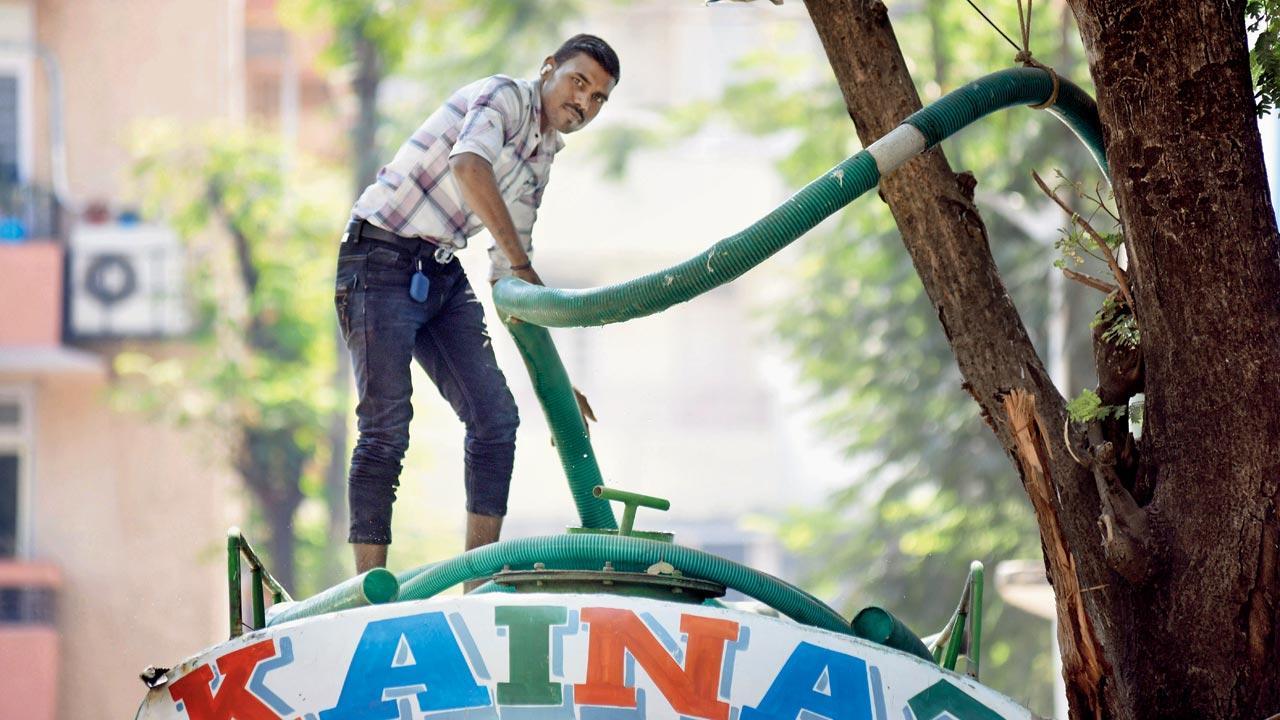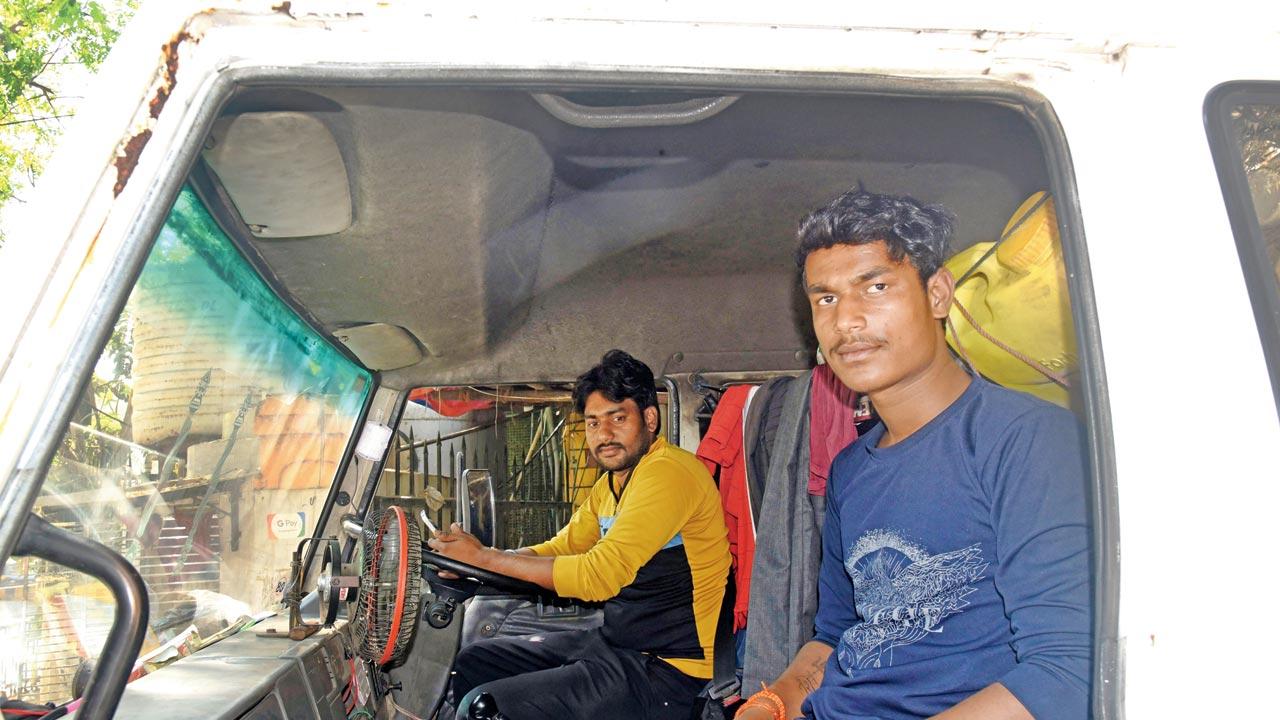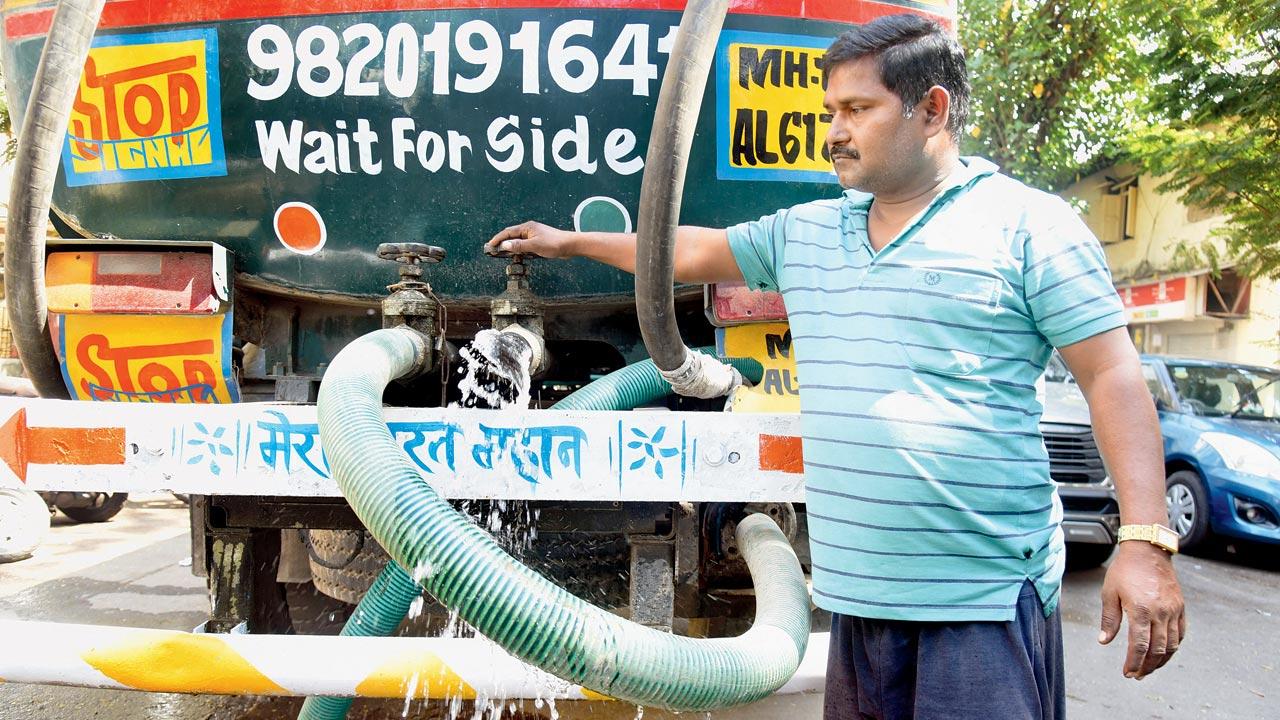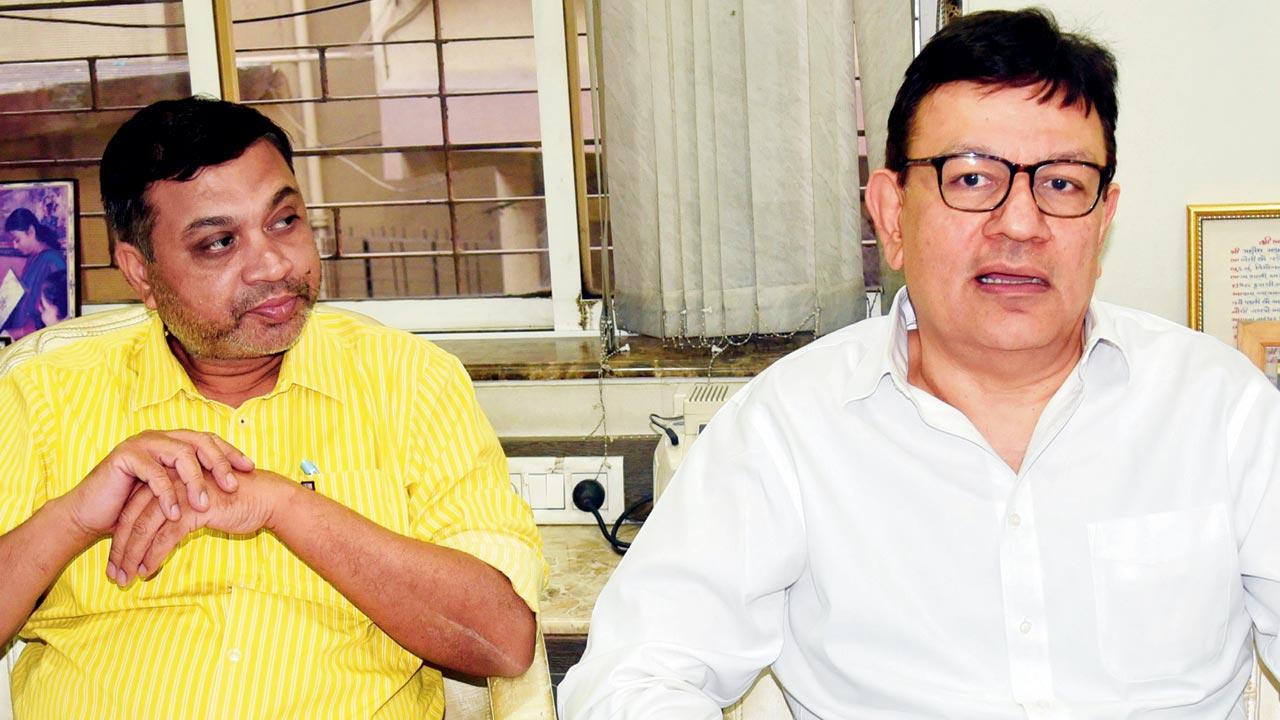The city’s water tankerwallahs who were forced to go on a five-day strike after being slapped with a police notice for theft last week, say restrictive guidelines are preventing them from doing their job

Rahul Verma, a resident from Pratapgarh, Uttar Pradesh, is among many from the district who work as water tanker drivers in the city. Pics/Sameer Markande
Over the last decade and more, men from Uttar Pradesh’s Pratapgarh district have been flocking to Mumbai. They don’t have big dreams. Neither are they hoping for a change in fortune. Their one wish—to become part of the large and growing network of tankerwallahs, supplying water to the city.
ADVERTISEMENT
Nandlal Santlal Prajapati was a farmer, before he arrived here 12 years ago. “I used to grow rice, wheat and potato,” he tells mid-day, “Then a friend in the village who worked with a water tanker supplier in Mumbai, convinced me to join him. He promised to teach me how to drive, and get me a job.” Until before that, Prajapati says he hadn’t even driven a vehicle. “But I managed to learn and within one-and-a-half years.” Prajapati has since been given charge of a 10,000 litre-water tank that serves different parts of the city. Working on a 12-hour shift daily, with no weekends to his name, the only time Prajapati takes a break is during the monsoon, when the water needs of the city’s residents are at bare minimum.
 Driver Kallu Yadav (with helper Deepak Kol) works from 8 am to 8 pm, supplying water between Nepean Sea Road and BKC
Driver Kallu Yadav (with helper Deepak Kol) works from 8 am to 8 pm, supplying water between Nepean Sea Road and BKC
The day we meet him, work has resumed after a five-day strike led by the Mumbai Water Tanker Association (MWTA), the apex body of operators supplying potable and non-potable water to the 24 municipal wards that don’t have a pipeline connection from the Brihanmumbai Municipal Corporation. The MWTA was protesting the new guidelines laid down by the Central Ground Water Authority (CGWA) in September 2020. The guidelines, introduced in light of the depleting ground water levels across India, demanded that water tanker owners get NOCs to abstract groundwater, and renew it every two years. Further, the CGWA asked bulk suppliers to pay annual water charges in advance, and provide proof of ownership of at least 200 sqm around the well and mandated that operations such as drawing and filling up of water in tankers take place within this periphery.
When we arrive, Prajapati is busy at work, refilling water drums at a Metro construction site near Canossa High School in Mahim. “These sites have been hit worse... a day into the strike, the workers started pleading to give them water. But it was my boss’s decision [to go on strike], I couldn’t do anything,” he says, “The toilets were choked up, when I came here an hour ago. Bahut buri haalat thi.” Of late, Prajapati provides water to constructions sites between Dadar and BKC. He draws his water from a few wells in Mahim and Dadar. Earning a salary of R27,000 per month, Prajapati who lives with three others in a small room in Mahim, has recently managed to buy a home for himself in Vasai. “When my family visits in March this time, we will all stay there,” he smiles.
 Nandlal Santlal Prajapati was a farmer before he arrived here 12 years ago. He supplies water to Mumbai’s Metro construction sites
Nandlal Santlal Prajapati was a farmer before he arrived here 12 years ago. He supplies water to Mumbai’s Metro construction sites
Just a lane away, Rahul Verma, another resident from Pratapgarh, has climbed up a tanker to pull out a pipe to feed water to a residential highrise in Mahim. Verma and Prajapati have crossed paths on several occasions, but don’t know each other too well. “Hamare gao se hai... woh humein pata hai,” Verma tells us. Verma moved to Mumbai in 2015. “My uncle Vijay Verma has nearly 2,000 tankers in the city. He thought I was wasting my time in Pratapgarh, and asked me to join him. I spent several years working with him as a helper... two years ago, after I got my own licence, I was given charge of a tanker.” Verma, who earns a salary of R20,000, splits his time between Mumbai and Pratapgarh, where he recently started a cement factory business of. “This job has helped change the lives of many people in my village,” he claims.
While the strike was called off last Tuesday, after Deputy Chief Minister Devendra Fadnavis informed the association that no action would be taken against them, Rajesh Thakur, secretary of MWTA, says they haven’t been given an assurance in writing. The association members claim that they have been harassed on multiple occasions. According to Jeetu Shah, vice-president, MWTA, the BMC first sent a notice in January 2021, mandating that the association adheres to the CGWA rules. “But we had opposed a few of the guidelines, which included paying a one-time fee to the Centre annually. We provide the city water only for seven months of the year [mid October to May], why should we pay for the whole year? We also challenged the rule that we own 200 sqm plot around the water source; in Mumbai, where space is an issue, this isn’t possible. Our objections were even conveyed to the CGWA representative,” say Shah and Thakur. Matters came to a head, when the MWTA received a circular from the Mumbai Police on February 7, stating that they were being charged under Sections 379, 426 and 430 for water theft. “We decided to go on strike the following day,” says Thakur. He feels that if the CGWA remains insistent on implementing the new guidelines, around 1,800 tankers meeting nearly 500 million litres per day (MLD) demand of water in the city, would have to go off the roads. “Over 5,000 tanker drivers and helpers, and another additional 2,200 staffers, could lose their jobs,” says Thakur. These tankers help meet the demands of residential societies, hotels, the railways, infra projects like the Coastal Road, Metro, under-construction sites, and beautification projects.
 Rajesh Thakur and Jeetu Shah
Rajesh Thakur and Jeetu Shah
At present, Mumbai receives water from seven lakes. While the BMC supplies 3,750 MLD across Mumbai, the city’s total demand is close to 4,500 MLD. The water tankers contribute significantly towards the 750 MLD shortfall. In earlier times, the city relied on other alternative sources—a more nostalgic reference would be the sight of bhistis negotiating the narrow gullies, buried under the weight of leather mashaqs they carried on their shoulders; the community is now a dying tribe.
The municipal corporation’s ambitious desalination project, to be setup near Manori, and which is estimated to supply nearly 200 MLD in the initial stage, may still not help tide the present water deficit.
In light of this, a future foolproof plan to safeguard water tankers, still eludes the state government.
Water tanker drivers like Kallu Yadav, who works from 8 am to 8 pm, supplying water between Nepean Sea Road and BKC, says he will continue to work, until he is allowed to. Yadav, a Dharavi resident, hails from Rewa in Madhya Pradesh. He moved to Mumbai in his late teens, desperate for work. “The water that the BMC provides to most residential societies and hotels in insufficient. We provide water to them every alternate day. If we don’t, most homes will run dry. I can’t even afford to take leave during this time,” he adds.
Sultanpur resident Harikesh Verma, who supplies water in Ghatkopar, took over the job from his father, after he fell ill. “I have been here since 2011. The truth is, I don’t know anything beyond this job. I make a salary of R20,000 and it helps run my house in our village. If I lose this job, I will have to start all over again.”
500 M
Litres per day demand of water met by 1,800 tankers
Also Read: Upcoming book traces the extent of corruption in the BCCI
 Subscribe today by clicking the link and stay updated with the latest news!" Click here!
Subscribe today by clicking the link and stay updated with the latest news!" Click here!







